List of Puerto Rico hurricanes (2000–present)
Appearance
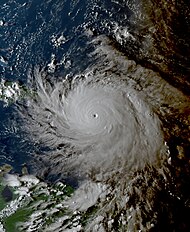
The list of Puerto Rico hurricanes from the 21st century has been marked by several devastating North Atlantic hurricanes, tropical or subtropical cyclones, their remnants, or their precursors have affected the U.S. territory of Puerto Rico. Every year included has at least one tropical cyclone affecting the territory.
The strongest hurricane to hit the territory during the time period was Hurricane Maria, which was a Category 4, on the Saffir–Simpson scale, the second-highest category on the scale. Maria was the strongest hurricane to strike the territory since 1928 Okeechobee hurricane.
2000
[edit]
- August 23 – Hurricane Debby dropped up to 12 inches (30.5 mm) of rainfall across Puerto Rico in less than 48 hours, causing mudslides and damage to bridges and roads. There were 406 homes affected from the flooding, 5 of which were moderate to severely damaged. Losses in Puerto Rico reached $501,000, primarily in the Caguas municipality.[1][2] The storm was also indirectly responsible for the death of a 78-year-old man who fell while trying to remove a satellite dish from the roof of his home.[3]
- September 17–18 – The wave to Tropical Storm Helene passed to the south of Puerto Rico on September 17 and 18. Across the southern and eastern portion of the island, the system produced 6 to 12 in (150 to 300 mm) of rainfall, which resulted in flash flooding and mudslides. One house was destroyed and more than 100 houses were affected in Ponce, forcing several families to evacuate. The flooding also destroyed a bridge in Guayama and made many roads impassable. Damage on the island was estimated at $100,000 (2000 USD).[4]
2001
[edit]
- August 18 - the outer rainbands of Tropical Storm Chantal produced light to moderate rainfall across Puerto Rico and the United States Virgin Islands. In Puerto Rico, the highest rainfall total was 2.4 inches (61 mm) in Rio Piedras.[5]
- August 22–23 – Tropical Storm Dean dropped heavy rainfall across Puerto Rico, peaking at 12.7 inches (322 mm) in Salinas. The passage of Dean resulted in widespread flooding in eastern and southern Puerto Rico, collapsing two bridges and one road. Several highways were under water, and one car was swept away by the floodwaters. The four inside the vehicle were later rescued and unharmed. Throughout the island, about 1,320 houses were flooded, and two houses experienced collapsed roofs. The rains left various towns without power or water.[6] Two people were injured in Peñuelas,[6] and three were injured in Nagüabo when the ceiling of a day care center collapsed,[7] though no deaths occurred on the island.[6] One airline canceled seventeen flights in and out of the island, and one cruise line was required to alter its path to both Dean and earlier due to Tropical Storm Chantal.[7] Damage in Puerto Rico totaled to $7.7 million (2001 USD, $9.4 million 2008 USD), of which $2.1 million (2001 USD, $2.6 million 2008 USD) was from agricultural damage.[6]
2003
[edit]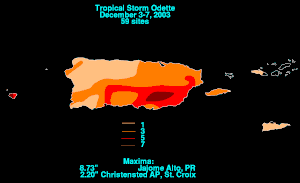
- August 18 - Tropical Depression Nine caused moderate rainfall in Puerto Rico, where 2 to 3 inches (50 to 75 mm) of precipitation were recorded.[8] Damage in Puerto Rico totaled $20,000 (2003 USD, $33,126 2024 USD).[9]
- October 10–11 - Tropical Storm Mindy caused rainfall levels that reached up to 7.13 inches (181 mm) near Ponce, Puerto Rico.[10] Strong winds left around 29,000 people without power in northeastern Puerto Rico.[11] The rainfall wrecked bridges in Las Piedras and Guayama,[12][13] and led to flooded streams, downed trees, and rockslides that closed four roads. One car was swept away,[14] and a few houses were flooded.[15] The damage total was at least $46,000 (2003 USD).[12][13][16]
- December 8–10 - Tropical Storm Odette caused moderate rainfall across Puerto Rico. Rainfall in Puerto Rico was heaviest in the southeast, where a peak of 8.73 in (221.74 mm) was recorded in Jajome Alto.[17] Odette's rainfall caused flooding throughout Puerto Rico's rivers. The river flooding destroyed three bridges, resulting in $20,000 in damages (2003 USD).[18]
2004
[edit]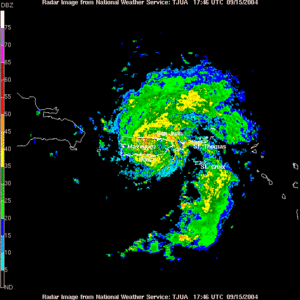
- September 15–16 - Upon striking Puerto Rico, Tropical Storm Jeanne produced tropical storm force winds in portions of the island. A NWS employee reported sustained winds of 63 mph (101 km/h), with gusts to 71 mph (114 km/h) in Salinas along the southern coast.[19] In Cayey, located in the center of the island, a 72 mph (117 km/h) gust was reported, just shy of hurricane force. Additionally, the Luis Muñoz Marín International Airport in San Juan reported sustained winds of 49 mph (80 km/h).[20] In Yabucoa, the winds killed one woman after she was flung into a wall.[4] A total of 8 were killed, and damage totaled $169.5 million (2004 USD),[21][22] making it the most damaging tropical cyclone since Hurricane Georges in 1998.[23][24]
2006
[edit]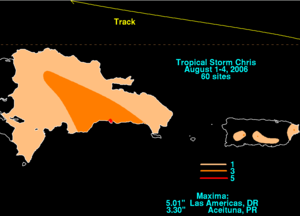
- August 3 - Tropical Storm Chris dropped light rainfall in Puerto Rico, peaking at 3.09 inches (78 mm) in Fajardo.[20] The rainfall from the storm caused the Fajardo River to overflow its banks, which temporarily closed a highway in the northeastern portion of the island.[25]
2007
[edit]
- October 26 - The precursor of Hurricane Noel dropped heavy rainfall across Puerto Rico for several days, leaving grounds saturated and causing surface runoff.[26] Precipitation peaked at 17.23 inches (438 mm) at Carite Lake.[27] Flash flooding was reported in Carolina, and a mudslide occurred in Utuado. Flooding occurred along several rivers, including the Río de la Plata, with a reading of 8.9 feet (2.7 m) above flood stage at Toa Baja reported late on October 27.[26] In response to high water levels, officials opened dam gates along the Río de la Plata and the Río Carraízo.[28] There were no official reports of fatalities.[29]
- December 11–12 - Tropical Storm Olga dropped light to moderate precipitation across Puerto Rico, peaking at 11.13 inches (283 mm) near Ponce.[30] The rainfall increased levels along several rivers across the island, including the Río Grande de Arecibo which was reported at several feet above flood stage.[31] Its passage left about 79,000 people without power and 144,000 without water.[32] In the northern portion of the island, the rainfall caused a mudslides that buried an automobile, which killed its driver.[33]
2008
[edit]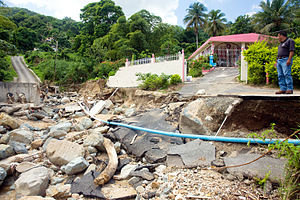
- August 30–31 - Some areas of northeastern Puerto Rico observed 10–12 inches (250–300 mm) of rain in only 24 hours due to Tropical Storm Hanna. As a result, many rivers exceeded their banks and several mudslides were reported. A number of streets were inundated and later closed. The Westin Rio Mar Golf Club course in Río Grande was also flooded. On the western side of the island in Añasco, residents fled their homes for shelters.[34]
- September 21–23 - The precursor to Hurricane Kyle produced record-breaking rains over Puerto Rico from September 21 to 23.[35] With isolated maxima in excess of 30 inches (760 mm), rivers breached their flood walls and flooded low-lying areas.[36] Damage to agriculture on the island was estimated to be $23 million and structural damage was estimated at $25 million, for a total of $48 million.[37][38]
- October 13–16 - The precedent to Hurricane Omar produced heavy rains over the island, causing minor flooding.[39] After passing by Puerto Rico a second time, Omar produced locally heavy rains, which caused minor street flooding.[40] A man died after he collapsed from cardiac arrest while trying to install storm shutters on his home.[41]
2009
[edit]
- August 17 - Minor rainfall from Tropical Storm Ana triggering minor flooding but little damage.[42] A maximum of 2.76 in (70 mm) of rain fell in Río Grande.[43] The rains caused the Río Fajardo to rise, resulting in the issuance of an alert as officials warned it could overflow its banks. Several streets were temporarily shut down due to flooding, including one tunnel, and three schools had to be evacuated. Throughout the island, roughly 6,000 people were left without power as numerous branches were snapped off trees and knocked down power lines.[44]
- August 22 - Large, life-threatening swells produced by Hurricane Bill impacted north-facing coastlines of Puerto Rico[45][46]
- September 4 - The remnants of Tropical Storm Erika produced significant amounts of rainfall, causing the rivers of La Plata, Loíza and Caguitas to overflow their banks and trigger widespread flooding.[47] A weather station in Naguabo recorded 7.92 in (201 mm) of precipitation.[48][49] Several other areas recorded upwards of 4 in (100 mm).[49] In the municipality of Guanica, several homes were flooded, leaving $5,000 in damage.[50] The most severe damage took place in the municipality of Las Piedras where $15,000 was reported in flood losses.[51] One river rose to a level of 29.27 ft (8.92 m), 7.27 ft (2.22 m) above flood stage.[52] Damage in Fajardo was estimated at $10,000 after homes were inundated by flood waters.[53] Additionally, flooding in Caguas resulted in $5,000 in damage.[54]
2010
[edit]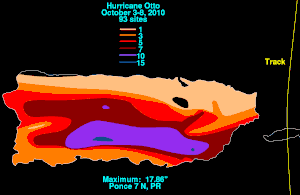
- July - The precursor to Tropical Storm Bonnie brought significant rainfall to parts of Puerto Rico and Hispaniola, leading to widespread flooding. In Puerto Rico, one person drowned after being caught in a swollen river.[55][56]
- August 30–31 - Heavy rains from Hurricane Earl began to affect Puerto Rico as Hurricane Earl moved closer to the island.[57] Throughout the island, a maximum of 5.19 in (132 mm) of rain fell near Naguabo.[58] In San Juan, 3.57 inches (91 mm) of rain fell during the passage of Earl.[59][60] Dozens of roads were shut down across the island due to flooding and downed power lines. At the height of the storm, roughly 187,000 residences were left without power and 60,000 more were without water.[61][62]
- September 7–8 - The remnants of Tropical Storm Gaston produced sporadic rainfall across Puerto Rico, peaking at 3.03 in (76.9 mm) in Naguabo.[63]
- September 16–21 - Hurricane Igor large swells averaging 9 to 13 ft (2.7 to 4.0 m) in height.[64] Similar conditions affected Puerto Rico where another person drowned.[65] On several occasions, Luquillo was flooded by the surf, though no damage took place.[66]
- October 5–8 Rain began to pour across several parts of Puerto Rico due to Hurricane Otto, persisting for up to five days in some areas. The greatest amount of rainfall during the six-day period of October 3 to 8 was registered at Rio Portugues in Ponce, with 17.86 inches (454 mm) recorded.[67] Subsequent widespread flooding affected at least 295 roads, 14 of which suffered significant damage. In all, damage to road infrastructure was preliminarily estimated at US$6.5 million.[68] In addition, the municipality of Ponce reported copious losses in agriculture, later estimated at US$1.5 million.[69]
2011
[edit]
- August 2–3 While moving south of Puerto Rico, Tropical Storm Emily brought prolonged tropical storm conditions to many parts of the island. The heaviest rainfall occurred in southern regions; Caguas recorded a total of 8.22 in (209 mm) of rain during the storm.[70][71] High winds damaged an electrical grid, cutting off power to about 18,500 customers.[72] Throughout the island, multiple roads were made impassable by landslides and fallen objects;[73] infrastructural damage surmounted $5 million, according to preliminary estimates.[74] Capital losses were estimated at $55 million.[75]
- August 21–23 - Across Puerto Rico, heavy rains from Hurricane Irene caused extensive damage to roads while hurricane-force winds toppled many trees and utility poles, which led more than 1 million residences without power.[76][77] At higher elevations, winds estimated by radar neared 111 mph (179 km/h).[78] The highest amounts of precipitation fell across eastern parts of the territory; in Gurabo, a peak total of 22.04 in (560 mm) was recorded.[79] The rains continued to fall for hours into the wake of the storm.[80] One driver was killed after their vehicle was caught in swollen currents.[81] Preliminary estimates indicate structural damage could be as high as $500 million (USD), with additional losses due to the three-day labor suspensions pinned at over $60.4 million (USD).[82]
- September 11–12 - Hurricane Maria effects on the island of Puerto Rico were primarily in the form of heavy rainfall. Flood waters near Patillas, Puerto Rico, destroyed several homes and bridges, causing $1.3 million (2011 USD) in damage.[83][84][85] In the surrounding city of Yabucoa, Puerto Rico, heavy rainfall flooded and damaged around 150 homes.[83] Many people were forced to relocate after rainfall and mud filled their homes. Near the city of Naguabo, Puerto Rico, the car of a 60-year-old woman was swept away by flood waters on a road. After becoming tangled in bushes, the woman was able to get out of her car and pulled to safety.[86]
2012
[edit]
- August 4 - In Puerto Rico, some areas experienced locally heavy rainfall due to Tropical Storm Ernesto, especially the southern half of the island. The heaviest amount of precipitation observed was 8.39 in (213 mm) near Jayuya.[87] A few mudslides occurred and some streets flooded, leaving at least three cars stranded.[88]
2013
[edit]
- July 9 - Although sustained winds in Puerto Rico remained below tropical storm force, a weather station at Las Mareas in Guayama observed a wind gust of 51 mph (82 km/h) late on July 9 due to Tropical Storm Chantal. Winds toppled trees and power lines, blocking several roads.[89]
- September 5–7 - During a 48-hour period, the disturbance to Tropical Storm Gabrielle brought 6 to 8 in (150 to 200 mm) of rain to some areas of Puerto Rico.[90] A mudslide detached part of a small bridge on Highway 184.[91]
2014
[edit]
- August 2–3 - Across Puerto Rico, the outer bands of Tropical Storm Bertha dropped a general 3 to 5 in (76 to 127 mm) of rain,[92] with isolated areas reaching 10 in (250 mm), over areas suffering from a drought.[93] Accumulations peaked at 11.11 in (282 mm) in Adjuntas.[94] Landslides blocked a few roads around Aceitunas.[95] Tropical storm-force wind gusts, peaking at 52 mph (84 km/h),[94] downed some trees and power lines.[96][97] Prolific lightning accompanied the storm and resulted in 29,000 residences losing power.[92]
- August 22–24 - As Hurricane Cristobal's parent wave moved over Puerto Rico, it engaged with an abnormally moist air mass to produce torrential rains totaling more than 10 in (250 mm).[98] The highest rainfall totals were enhanced by orographic lift over mountainous terrain. A rain gauge near Tibes recorded a peak total of 13.21 in (336 mm), the majority of which fell on August 24. Luis Muñoz Marín International Airport near San Juan reported 5.52 in (140 mm) of precipitation. The floods cut electricity to nearly 17,000 customers and left 7,000 without clean drinking water after putting some 18 filtration plants out of service.[99]
- October 14–15 - Hurricane Gonzalo produced squally weather in parts of Puerto Rico, causing power outages and prompting 20 people to stay in an emergency shelter.[100][101]
2015
[edit]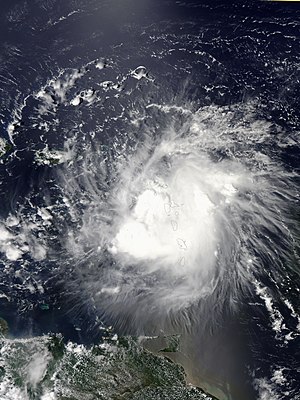
- August 28 - The outer bands of Tropical Storm Erika brought much-needed rain to drought-stricken Puerto Rico;[102] a station in Adjuntas recorded 4.45 in (113 mm) of rain.[103] Tropical storm-force wind gusts, peaking at 59 mph (95 km/h) in Maricao,[103] caused substantial disruption to the power grid, leaving approximately 250,000 people without electricity.[104] Thirty-six homes sustained roof damage across interior locations of the territory and agriculture sustained US$17.37 million in damage.[105]
2017
[edit]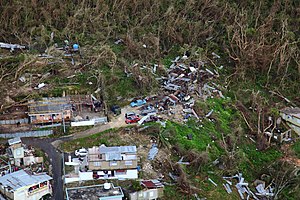
- September 6–7 - Hurricane Irma passed north of Puerto Rico, but still caused significant damage to the United States territory. Much of the main island experienced sustained tropical storm force winds, with a peak sustained wind speed of 55 mph (89 km/h) at a weather station along San Juan Bay.[106] Portions of Puerto Rico received heavy rainfall, with a peak total of 13.04 in (331 mm) in Bayamón.[106] On Culebra, the island suffered an almost complete loss of electrical and water services.[107] Hurricane Irma was attributed to around $1 billion in damage,[108] and the NHC attributed three fatalities to Irma in Puerto Rico, though four deaths were related to the storm.[106][109]
- September 20–21 - Hurricane Maria made landfall near Yabucoa, Puerto Rico, causing catastrophic damage.[110] The island's electric grid was devastated, leaving all 3.4 million residents without power.[111] The hurricane caused about $90 billion in damage in Puerto Rico and the USVI. An estimated 2,975 people in total died in Puerto Rico as a result of Hurricane Maria, in the six months after the hurricane[112]
2018
[edit]
- July 9–10 - Over 8 inches of rain fell in Puerto Rico from Hurricane Beryl.[113] The enhanced rainfall also triggered flash flooding. A landslide was reported in the town of Naranjito.[114] Vehicles were trapped on Puerto Rico Highway 909 near Humacao after the road was inundated by floodwaters.[115] By the time the storm passed, approximately 47,000 Puerto Ricans lost power on the island.[106][116]
2019
[edit]
- August 28–29 - Hurricane Dorian moved farther northeast than initially anticipated, resulting in very limited effects in Puerto Rico.[117] A man in Bayamón died when he fell off his roof trying to clean drains in advance of the storm.[118]
- September 24–25 - Tropical Storm Karen dropped a peak precipitation amount of 5 inches (130 mm) in Coamo, where a bridge was swept away, isolating 15 families.[119][120] Numerous roads across the island were flooded and became impassible due to mudslides and runoff.[121] River floods were reported in Utuado, Jayuya and Yabucoa municipalities with a mudslide also occurring in Jayuya municipality.[122] The Culebrinas River overtopped its banks, causing flooding in Aguadilla.[123] Roughly 29,000 customers lost electricity in Puerto Rico.[124] A mudslide blocked part of Puerto Rico Highway 14 in Aibonito.[125] In Toa Baja, two people were trapped in a house by flooding.[126]
2020
[edit]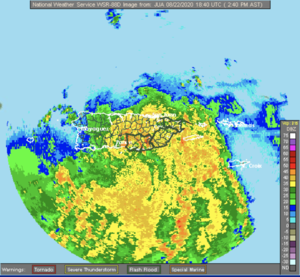
- July 30–31 - In Puerto Rico, Hurricane Isaias caused about 448,000 people and 23 hospitals to lose power and about 150,000 people lost water service due to electric blackouts and blocked intakes.[127][128] In Jayuya, a town in the center of Puerto Rico experienced substantial effects including the loss of its 1.5 million dollar hot air balloon, an important tourist attraction.[129] Due to the extensive damage, President Donald Trump approved an emergency declaration request from Puerto Rico's governor Wanda Vázquez Garced.[130]
- August 22–23 - In Puerto Rico, Tropical Storm Laura downed trees and caused flooding in Salinas.[131] Part of the Salinas city sign was also blown over during the storm.[132] A peak of 4.09 in (104 mm) of precipitation was reported in Villalba, with a peak wind gust of 75 miles per hour (120 km/h) being reported in Salinas.[133] Roughly 200,000 customers lost power in Puerto Rico, with nearly 14,000 losing access to running water.[134]
- September 18 (indirect) - A man and a woman drowned in the waters off La Pocita Beach in Loíza, Puerto Rico due to the rip currents and churning waves that Hurricane Teddy had caused in the north of the Lesser and Greater Antilles.[135][136]
2021
[edit]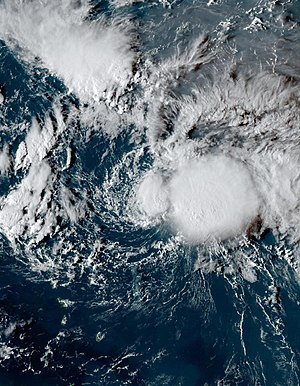
- August 11 - Tropical Storm Fred caused a 55 km/h (34 mph) wind gust in Lajas.[137]
- September (indirectly) - Rough surf and rip currents generated by Hurricane Larry's large wind field led to a drowning in Puerto Rico.[138]
- September 21 - Tropical Storm Peter brought heavy rain showers to Puerto Rico, as it tracked to its north. In the country, the towns of Lares and Morovis both observed up to 3.76 in (96 mm) of precipitation, although parts of the former may have experienced rainfall totals up to 5 to 6 in (130 to 150 mm).[139] This caused a few mudslides and minor flooding in some areas, including in Carolina, Corozal, Utuado, and Vega Baja. Damage on Puerto Rico totaled about $12,000.[140]
2022
[edit]
- September 4–5 - The outerbands of Hurricane Earl produced rainfall amounts generally ranging from 3 to 5 in (76 to 127 mm) in eastern Puerto Rico, while a weather station near Finca La Loma recorded a peak total of 7.7 in (200 mm) of precipitation. Two people died near Salinas after being struck by lightning while riding a jet ski.[141]
- September 18–19 - Hurricane Fiona caused a power outage in the entirety of Puerto Rico.[142] The winds from the storm covered the entire island bringing heavy rainfall.[142] Roads were stripped of pavement due to Fiona's torrential rainfall, roofs were torn off houses, and at least one bridge was completely washed away. A gauge near Ponce measured 31.34 inches (796.0 mm) inches of rain,[143] Many landslides were recorded throughout the island.[144] Many crops were destroyed[145][146]
- November 4–6 - Torrential rains of 4–8 in (100–200 mm) fell on Puerto Rico due to Hurricane Nicole.[147]
2023
[edit]- August 22-24 - Tropical Storm Franklin affected Puerto Rico.
Monthly statistics
[edit]
|

|
See also
[edit]- List of Puerto Rico hurricanes
- List of Florida hurricanes (2000–present)
- List of United States hurricanes
References
[edit]- ^ First hurricane of the 2000 season and first hurricane to threaten PR-VI in August since Hurricane Dean in 1989 (Report). San Juan, Puerto Rico. 2000. Archived from the original on November 8, 2001. Retrieved January 29, 2023.
- ^ STORM DATA AND UNUSUAL WEATHER PHENOMENA WITH LATE REPORTS AND CORRECTIONS (PDF) (Report). San Juan, Puerto Rico. 2000. Archived from the original (PDF) on December 3, 2013. Retrieved January 29, 2023.
- ^ 2000 hurricane damage reports (Report). Hurricane City. Archived from the original on May 18, 2011. Retrieved April 30, 2011.
- ^ a b "Storm Data September 2000" (PDF). National Climatic Data Center. National Oceanic and Atmospheric Administration. Archived from the original (PDF) on December 3, 2013. Retrieved December 18, 2013.
- ^ Roth, David (2007-01-20). "Tropical Storm Chantal Rainfall Summary". Hydrometeorological Prediction Center. Retrieved 2008-05-08.
- ^ a b c d National Climatic Data Center (2001). "Event Report for Puerto Rico". Archived from the original on 2011-05-19. Retrieved 2006-11-07.
- ^ a b "Storm Dean Weakens in Caribbean". Associated Press. 2001-08-24. Archived from the original on 2016-01-18. Retrieved 2006-11-07.
- ^ National Climatic Data Center (2003). "Event Report for Puerto Rico". Archived from the original on 2011-05-19. Retrieved 2006-10-24.
- ^ National Climatic Data Center (2003). "Event Report for Puerto Rico (2)". Archived from the original on 2011-05-19. Retrieved 2006-10-24.
- ^ David M. Roth (2005). "Rainfall Information for Tropical Storm Mindy". Hydrometeorological Prediction Center. Archived from the original on September 22, 2013. Retrieved 2006-10-09.
- ^ National Climatic Data Center (2003). "Event Report for Puerto Rico (6)". Archived from the original on December 7, 2008. Retrieved October 9, 2006.
- ^ a b National Climatic Data Center (2003). "Event Report for Puerto Rico (8)". Archived from the original on December 7, 2008. Retrieved October 9, 2006.
- ^ a b National Climatic Data Center (2003). "Event Report for Puerto Rico (12)". Archived from the original on December 7, 2008. Retrieved October 9, 2006.
- ^ National Climatic Data Center (2003). "Event Report for Puerto Rico (3)". Archived from the original on 2007-06-13. Retrieved 2006-10-09.
- ^ National Climatic Data Center (2003). "Event Report for Puerto Rico (4)". Archived from the original on 2007-06-13. Retrieved 2006-10-09.
- ^ National Climatic Data Center (2003). "Event Report for Puerto Rico (11)". Archived from the original on 2007-06-13. Retrieved 2006-10-09.
- ^ David M. Roth (2007-06-20). Tropical Storm Odette - December 3-7, 2003 (Report). Hydrometeorological Prediction Center.
- ^ "December 2003 Storm Data and Unusual Weather Phenomena" (PDF). 45 (12). National Climatic Data Center. Retrieved 2013-01-12.
{{cite journal}}: Cite journal requires|journal=(help)[dead link] - ^ San Juan, Puerto Rico National Weather Service (2009-01-21). "Tropical Storm Jeanne moves across the U.S. Virgin Islands and Puerto Rico". National Oceanic and Atmospheric Administration. Retrieved 2010-12-18.
- ^ a b Miles B. Lawrence and Hugh D. Cobb (2005-01-07). "Hurricane Jeanne Tropical Cyclone Report" (PDF). National Hurricane Center. Retrieved May 22, 2015.
- ^ "Puerto Rico Event Report: Tropical Storm". National Climatic Data Center. National Oceanic and Atmospheric Administration. 2004. Archived from the original on 2021-12-21. Retrieved December 21, 2021.
- ^ "Puerto Rico Event Report: Tropical Storm". National Climatic Data Center. National Oceanic and Atmospheric Administration. 2004. Archived from the original on 2021-12-21. Retrieved December 21, 2021.
- ^ National Climatic Data Center (2010). "Hurricane Events in Puerto Rico". Retrieved 2010-12-28.[permanent dead link]
- ^ National Climatic Data Center (2010). "Hurricane Events in Puerto Rico". Retrieved 2010-12-28.[permanent dead link]
- ^ Miranda Leitsinger (2006-08-04). "Tropical Storm Pushes Across Caribbean". Washington Post. Associated Press. Retrieved 2006-08-04.
- ^ a b Puerto Rico National Weather Service (2007). "Watches and Warnings for Puerto Rico on October 27, 2007". NOAA. Archived from the original on November 2, 2007. Retrieved 2007-10-28.
- ^ David Roth (2007). "Tropical Storm Noel Rainfall Summary". Hydrometeorological Prediction Center. Retrieved 2007-11-04.
- ^ Prensa Asociada (2007). "Seguirá lloviendo". Primera Hora (in Spanish). Archived from the original on October 30, 2007. Retrieved 2007-10-28.
- ^ Brown, Daniel P; National Hurricane Center (2007-12-17). Hurricane Noel (PDF) (Tropical Cyclone Report). United States National Oceanic and Atmospheric Administration's National Weather Service. p. 4. Archived (PDF) from the original on 2012-06-12. Retrieved 2012-06-01.
- ^ David Roth (2007). "Rainfall Summary for Tropical Storm Olga". Hydrometeorological Prediction Center. Retrieved 2007-12-20.
- ^ Puerto Rico National Weather Service (2007). "Watches, Warnings, and Advisories for Tropical Storm Olga in Puerto Rico". Archived from the original on 2012-02-11. Retrieved 2007-12-13.
- ^ Ramon Almanzar (2007-12-11). "Subtropical Storm Olga forces evacuations in Dominican Republic". Associated Press.
- ^ Ramon Almanzar (2007-12-12). "Tropical Storm Olga forces evacuations in Dominican Republic; one killed in Puerto Rico". Associated Press. Archived from the original on December 22, 2007. Retrieved 2007-12-13.
- ^ William Angel. Storm Data and Unusual Weather Phenomena: September 2008 (PDF). National Climatic Data Center (Report). Asheville, North Carolina: National Oceanic and Atmospheric Administration. p. 175. Archived from the original (PDF) on May 14, 2014. Retrieved May 13, 2014.
- ^ Rebecca Banuchi (September 23, 2008). "Heavy rains drench Puerto Rico". USA Today. Archived from the original on July 2, 2013. Retrieved May 20, 2009.
- ^ Steve Lang (September 30, 2008). "Hurricane Season 2008: Tropical Storm Kyle (Atlantic Ocean)". NASA. Retrieved May 20, 2009.
- ^ "NCDC Event Report". National Climatic Data Center. 2008. Retrieved February 10, 2021.
- ^ "NCDC Event Report". National Climatic Data Center. 2008. Retrieved February 10, 2021.
- ^ "Puerto Rico Event Report: Heavy Rain". National Climatic Data Center. National Oceanic and Atmospheric Administration. Retrieved July 9, 2021.
- ^ John Marino (October 16, 2008). "Hurricane Omar weakens after surging into Atlantic". Reuters. Retrieved March 18, 2009.
- ^ "Category 3 Hurricane Omar Slams Northern Caribbean". Fox News. Associated Press. October 16, 2008. Retrieved December 22, 2008.
- ^ "Tropical Depression Ana soaks Puerto Rico". Taiwan News. Associated Press. August 17, 2009. Archived from the original on August 20, 2009. Retrieved August 17, 2009.
- ^ David M. Roth (2009). "Tropical Storm Ana - August 17–18, 2009". Hydrometeorological Prediction Center. Retrieved August 24, 2009.
- ^ Gerardo E. (August 18, 2009). "Ana se deja sentir en la Isla". El Nuevo Dia (in Spanish). Archived from the original on December 3, 2014. Retrieved August 18, 2009.
- ^ Agence France-Presse (August 22, 2009). "Bermuda placed on alert as Hurricane Bill advances". Taiwan News. Retrieved August 23, 2009.
- ^ "Worldwide Tropical Cyclone Names". National Hurricane Center. 2010. Archived from the original on 2010-12-07. Retrieved 2008-02-19.
- ^ Staff Writer (September 6, 2009). "Erika empapa a Puerto Rico y parte de Dominicana" (in Spanish). Diario Digital RD. Archived from the original on October 2, 2011. Retrieved September 6, 2009.
- ^ Hydrometorological Prediction Center (September 6, 2009). "Tropical Depression Erika - September 3–5, 2009". National Oceanic and Atmospheric Administration. Retrieved September 12, 2009.
- ^ a b National Weather Service in San Juan, Puerto Rico (September 6, 2009). "Preliminary Rainfall Totals From Remnants of Tropical Depression Erika in Puerto Rico". National Oceanic and Atmospheric Administration. Archived from the original on May 22, 2024. Retrieved September 6, 2009.
- ^ "Puerto Rico Event Report: Flash Flood". National Climatic Data Center. 2010. Archived from the original on May 22, 2024. Retrieved January 20, 2010.
- ^ "Puerto Rico Event Report: Flash Flood". National Climatic Data Center. 2010. Archived from the original on May 22, 2024. Retrieved January 20, 2010.
- ^ "Puerto Rico Event Report: Flash Flood". National Climatic Data Center. 2010. Archived from the original on May 22, 2024. Retrieved January 20, 2010.
- ^ "Puerto Rico Event Report: Flash Flood". National Climatic Data Center. 2009. Archived from the original on May 22, 2024. Retrieved January 20, 2010.
- ^ "Puerto Rico Event Report: Flash Flood". National Climatic Data Center. 2010. Archived from the original on May 22, 2024. Retrieved January 20, 2010.
- ^ "Se forma tormenta tropical Bonnie" (in Spanish). Impre. Associated Press. July 22, 2010. Archived from the original on March 10, 2012. Retrieved July 25, 2010.
- ^ Associated Press (July 23, 2010). "Bonnie Hits Florida on Way to Gulf". CBS News. Archived from the original on July 25, 2010. Retrieved July 25, 2010.
- ^ Henry Margusity (August 30, 2010). "Hurricane Earl Hitting the Virgin Islands and Flooding Puerto Rico". Accuweather. Archived from the original on September 1, 2010. Retrieved August 30, 2010.
- ^ David M. Roth (2010). "Hurricane Earl – August 29-September 4, 2010". Hydrometeorological Prediction Center. Retrieved October 5, 2010.
- ^ Resident of San Juan, Puerto Rico (August 30, 2010). "Daily Weather Summary for San Juan, Puerto Rico: August 30, 2010". Weather Underground. Retrieved August 30, 2010.
- ^ Resident of San Juan, Puerto Rico (August 31, 2010). "Daily Weather Summary for San Juan, Puerto Rico: August 30, 2010". Weather Underground. Retrieved August 31, 2010.
- ^ Gay Nagle Myers (September 1, 2010). "Hurricane Earl does damage in Anguilla". Travel Weekly. Archived from the original on January 16, 2017. Retrieved September 10, 2010.
- ^ Celso Hernandez (August 31, 2010). "Hurricane Earl- Aftermath Arecibo". Caribbean Hurricane Network. Retrieved August 31, 2010.
- ^ David M. Roth. Remnants of Gaston - September 6-7, 2010 (Report). Weather Prediction Center. Retrieved January 15, 2017.
- ^ "U.S. Virgin Islands Event Report: Coastal Flood". National Climatic Data Center. 2011. Retrieved March 10, 2011.
- ^ "Puerto Rico Event Report: High Surf". National Climatic Data Center. 2011. Retrieved March 10, 2011.
- ^ "Puerto Rico Event Report: Coastal Flood". National Climatic Data Center. 2011. Retrieved March 10, 2011.
- ^ David M. Roth (2010). "National Oceanic and Atmospheric Administration Puerto Rico Rainfall Map". Hydrometeorological Prediction Center. Retrieved 2010-10-15.
- ^ Staff Writer (2010). "6.5 millones en daños en carreteras" (in Spanish). Cyber News. Archived from the original on 2010-10-12. Retrieved 2010-10-11.
- ^ Reinaldo Milán (2010). "Por el coletazo de Otto: Cuantiosas pérdidas en agricultura" (in Spanish). La Perla del Sur. Archived from the original on 2014-01-02. Retrieved 2010-10-13.
- ^ Kimberlain, Todd B; Cangialosi, John P. (2012-01-13). Tropical Cyclone Report Tropical Storm Emily (AL052011): 2–7 August 2011 (PDF) (Report). National Hurricane Center. Retrieved 2012-01-13.
- ^ Tichacek, Mike (2011-07-27). "Tropical Weather Discussion". National Hurricane Center. Retrieved 2011-08-01.
- ^ Alvarado-León, Gerardo E. (2011-08-03). "Emily fue un ensayo". El Nuevo Día (in Spanish). Grupo Ferré-Rangel. Archived from the original on 2014-08-15. Retrieved 2011-08-05.
- ^ Staff reporter (2011-08-03). "Emily: Sigue las incidencias minuto a minuto". El Nuevo Día (in Spanish). Grupo Ferré-Rangel. Retrieved 2011-08-05.
- ^ Alcaide, Maria D. (2011-08-05). "Pérdidas de $5 millones en carreteras". Primera Hora (in Spanish). Grupo Ferré-Rangel. Archived from the original on 2011-08-07. Retrieved 2011-08-05.
- ^ EFE (2011-08-04). "El cese de operaciones del Gobierno por "Emily" acarreó pérdidas millonarias". La Prensa (in Spanish). La Prensa Foundation. Archived from the original on 2014-08-12. Retrieved 2011-08-05.
- ^ Deutsche Presse-Agentur (August 22, 2011). "Huracán "Irene" deja daños a su paso por Puerto Rico". El Regional del Zulia (in Spanish). El Regional del Zulia C.A. Archived from the original on September 28, 2011. Retrieved August 22, 2011.
- ^ Coto, Danica (August 22, 2011). "Hurricane Irene slams Puerto Rico; could hit US". Forbes. Archived from the original on August 27, 2011. Retrieved August 22, 2011.
- ^ Stewart, Stacy (August 22, 2011). "Hurricane Irene Tropical Cyclone Update". National Hurricane Center. Archived from the original on October 2, 2011. Retrieved August 22, 2011.
- ^ Roth, David M; Hydrometeorological Prediction Center (August 26, 2011). Hurricane Irene – August 21–24, 2011. United States National Oceanic and Atmospheric Administration's National Weather Service. Archived from the original on October 27, 2020. Retrieved January 27, 2021.
- ^ Cabiya, Yanira H. (August 22, 2011). "Se esperan unas 4 pulgadas más de lluvia en todo Puerto Rico". El Nuevo Día (in Spanish). Grupo Ferré-Rangel. Archived from the original on August 20, 2012. Retrieved August 23, 2011.
- ^ Votaw, Gary S.; Austin-Smith, Althea; Rosa, Luis; Mojica, Rafael. "Irene Sweeps across Puerto Rico and the U.S. Virgin Islands" (PDF). weather.gov. Archived (PDF) from the original on October 16, 2020. Retrieved January 27, 2021.
- ^ Kuilan, Gloria R. (August 25, 2011). "Los daños ascenderían a $500 millones". El Nuevo Día (in Spanish). Grupo Ferré-Rangel. Archived from the original on July 29, 2012. Retrieved August 25, 2011.
- ^ a b "Puerto Rico Event Report: Flood". National Climatic Data Center. National Oceanic and Atmospheric Administration. 2011. Retrieved January 21, 2021.
- ^ "Puerto Rico Event Report: Flash Flood". National Climatic Data Center. National Oceanic and Atmospheric Administration. 2011. Retrieved January 21, 2021.
- ^ "Puerto Rico Event Report: Flood". National Climatic Data Center. National Oceanic and Atmospheric Administration. 2011. Retrieved January 21, 2021.
- ^ "Puerto Rico Event Report: Flash Flood". National Climatic Data Center. National Oceanic and Atmospheric Administration. 2011. Retrieved January 21, 2021.
- ^ Roth, David M. (January 3, 2023). "Tropical Cyclone Point Maxima". Tropical Cyclone Rainfall Data. United States Weather Prediction Center. Retrieved January 6, 2023.
 This article incorporates text from this source, which is in the public domain.
This article incorporates text from this source, which is in the public domain.
- ^ Althea Austin-Smith (September 12, 2012). Monthly Report of Hydrological Conditions - August 2012 (PDF) (Report). San Juan, Puerto Rico: National Weather Service. p. 2. Retrieved January 30, 2017.
- ^ Gary Votaw; Luis Rosa; Walter Snell; Carlos Anselmi (2013). Tropical Storm Chantal (PDF) (Report). San Juan, Puerto Rico: San Juan National Weather Service Office. Archived (PDF) from the original on April 13, 2014. Retrieved April 9, 2014.
- ^ September 2013 Climate Report for Puerto Rico and the U.S. Virgin Islands (Report). San Juan, Puerto Rico: San Juan National Weather Service Office. October 10, 2013. Archived from the original on April 15, 2014. Retrieved April 14, 2014.
- ^ "Storm Data and Unusual Weather Phenomena" (PDF). Storm Data. 55 (9). Asheville, North Carolina: National Climatic Data Service: 285, 288. September 2013. ISSN 0039-1972. Archived from the original (PDF) on April 15, 2014. Retrieved April 14, 2014.
- ^ a b "Tropical Storm Bertha slams Dominican Republic". Turks and Caicos Islands: CBS News. Associated Press. August 3, 2014. Retrieved August 13, 2014.
- ^ "Hurricane Bertha Recap: Much-Needed Rain For Puerto Rico, Rip Current Rescues Along U.S. East Coast". The Weather Channel. August 6, 2014. Archived from the original on August 14, 2014. Retrieved August 15, 2014.
- ^ a b Eric S. Blake (December 18, 2014). Tropical Cyclone Report: Hurricane Bertha (PDF). National Hurricane Center (Report). Miami, Florida: National Oceanic and Atmospheric Administration. Retrieved December 21, 2014.
- ^ "Los efectos de la tormenta tropical Bertha a su paso por Puerto Rico" (in Spanish). BBC Mundo. August 4, 2014. Retrieved August 15, 2014.
- ^ National Weather Service Office in San Juan, Puerto Rico (2014). Puerto Rico Event Report: Tropical Storm. National Climatic Data Center (Report). National Oceanic and Atmospheric Administration. Retrieved June 1, 2015.
- ^ National Weather Service Office in San Juan, Puerto Rico (2014). Puerto Rico Event Report: Tropical Storm. National Climatic Data Center (Report). National Oceanic and Atmospheric Administration. Retrieved June 1, 2015.
- ^ Gary S. Votaw. "Flooding and Tropical Wave – August 21-24, 2014" (PDF). National Weather Service San Juan, Puerto Rico. Archived (PDF) from the original on March 4, 2016. Retrieved May 21, 2015.
- ^ "Mejoran las condiciones del tiempo". El Nuevo Día (in Spanish). August 24, 2014. Archived from the original on September 7, 2020. Retrieved May 21, 2015.
- ^ Thomas Barrabi (October 15, 2014). "Hurricane Gonzalo Update: Bermuda Declares Hurricane Watch, Storm Could Reach Category 4 Winds". International Business Times. Retrieved October 15, 2014.
- ^ "Daily Operations Briefing: Tuesday, October 14, 2014" (PDF). Federal Emergency Management Agency. U.S. Department of Homeland Security. Archived from the original (PDF) on July 17, 2015. Retrieved October 19, 2014.
- ^ "Erika soaks Puerto Rico after 4 killed in Dominica". San Juan, Puerto Rico: WPLG. Associated Press. August 28, 2015. Archived from the original on April 23, 2017. Retrieved August 28, 2015.
- ^ a b Richard J. Pasch and Andrew B. Penny (February 8, 2016). "Tropical Storm Erika" (PDF). Tropical Cyclone Report. Miami, Florida: National Hurricane Center. Retrieved March 8, 2016.
- ^ "Puerto Rico Event Report: Tropical Storm". National Climatic Data Center. National Weather Service Office in San Juan, Puerto Rico. 2015. Retrieved March 8, 2016.
- ^ "Puerto Rico Event Report: Tropical Storm". National Climatic Data Center. National Weather Service Office in San Juan, Puerto Rico. 2015. Retrieved March 8, 2016.
- ^ a b c d John P. Cangialosi; Andrew S. Latto; Robbie J. Berg (March 9, 2018). Hurricane Irma (AL112017) (PDF) (Report). Tropical Cyclone Report. National Hurricane Center. Archived (PDF) from the original on August 31, 2018. Retrieved March 12, 2018.
- ^ Cindy Burgos Alvarado (September 17, 2017). "Wrap-up of damages in P.R. caused by Hurricane Irma". Casiano Communications. Retrieved April 21, 2019.
- ^ Michelle Kaske and Alexander Lopez (September 19, 2017). "Puerto Rico Faces Hurricane Maria After Irma's $1 Billion Damage". Bloomberg.com. Bloomberg. Archived from the original on September 20, 2017. Retrieved September 19, 2017.
- ^ Storm Events Database (Report). National Climatic Data Center. 2017. Retrieved April 21, 2019.
- ^ Richard J. Pasch; Andrew B. Penny; Robbie J. Berg (February 14, 2019). Tropical Cyclone Report: Hurricane Maria (PDF) (Report). Miami, Florida: National Hurricane Center. Archived (PDF) from the original on April 20, 2018. Retrieved June 21, 2019.
- ^ Estefania Hernandez (September 22, 2017). "'Helpless, Worried and Sick': Puerto Rico's Vast Outages Leave Relatives on Mainland Worried". NBC New York. Archived from the original on September 22, 2017. Retrieved June 21, 2019.
- ^ Ascertainment of the estimated excess mortality from Hurricane Maria in Puerto Rico (PDF) (Report). Milken Institute of Public Health. August 28, 2018. p. iii. Archived (PDF) from the original on August 28, 2018. Retrieved August 28, 2018.
- ^ Davies, Richard (11 July 2018). "Breaking News: Dominican Republic and Puerto Rico – Evacuations After Storm Beryl Causes Flooding". floodlist.com. Floodlist. Archived from the original on December 23, 2020. Retrieved 2020-09-23.
- ^ "Beryl Knocks Out Power, Floods Homes on Islands Still Recovering From Last Year's Hurricanes – The Weather Channel". Archived from the original on December 23, 2020. Retrieved 24 July 2018.
- ^ Event: Flash Flood in Humacao, Puerto Rico (Report). National Centers for Environmental Information. July 10, 2018. Archived from the original on December 23, 2020. Retrieved December 21, 2020.
- ^ Breslin, Sean (July 9, 2018). "Beryl's Remnants Trigger Flooding in Puerto Rico, 24,000 Lose Power". The Weather Channel. Archived from the original on December 23, 2020. Retrieved July 9, 2018.
- ^ "Hurricane Dorian does little damage to U.S. Virgin Islands". CBC.ca. CBC. August 28, 2019. Archived from the original on September 1, 2019. Retrieved September 1, 2019.
- ^ Oliveira, Nelson (August 28, 2019). "Man, 80, dies while preparing for Hurricane Dorian in Puerto Rico". New York Daily News. Archived from the original on September 5, 2019. Retrieved August 28, 2019.
- ^ Faith Karimi, Steve Almasy (September 25, 2020). "Tropical Storm Karen speeds up after soaking Puerto Rico and the Virgin Islands". CNN. Retrieved December 26, 2020.
- ^ Alex Sosnowski (September 24, 2019). "Karen unleashes heavy rain on Puerto Rico as it moves into the open Atlantic". AccuWeather. Retrieved December 28, 2020.
- ^ "Tropical Storm Karen - September 24-25, 2019". National Weather Service - San Juan, PR. Retrieved December 26, 2020.
- ^ EFE (September 24, 2020). "La tormenta tropical Karen se mueve sobre el este de Puerto Rico" (in Spanish). Listin Diario. Retrieved December 27, 2020.
- ^ ECHO (September 26, 2019). "Puerto Rico - Tropical Cyclone KAREN update (GDACS, NOAA, SNM, media) (ECHO Daily Flash of 26 September 2019)". ReliefWeb. Retrieved December 28, 2020.
- ^ Ron Brackett; Jan Wesner Childs (September 25, 2019). "Tropical Storm Karen Causes Landslides, Power Outages in Puerto Rico, U.S. Virgin Islands". The Weather Channel. Retrieved February 29, 2020.
- ^ "Storm Events Database Event: Debris Flow in Aibonito, Puerto Rico". National Centers for Environmental Information. Retrieved December 29, 2020.
- ^ "Storm Events Database Event:Flash Flooding in Toa Baja, Puerto Rico (9/24/19)". National Centers for Environmental Information. Retrieved December 29, 2020.
- ^ "La tormenta tropical Isaías deja sin electricidad a 23 hospitales de Puerto Rico en plena pandemia". www.20minutos.es – Últimas Noticias. July 31, 2020. Archived from the original on August 1, 2020. Retrieved August 2, 2020.
- ^ "La AAA abre las compuertas de Carraízo tras aumento súbito del nivel del embalse". El Nuevo Día. July 30, 2020. Archived from the original on July 31, 2020. Retrieved July 30, 2020.
- ^ "Explota el globo aerostático de Jayuya". Telemundo (in Spanish). 2020-07-30. Retrieved 2021-03-27.
- ^ "Tropical Storm Isaias Triggers Flooding, Knocks Out Power to Tens of Thousands in Puerto Rico". weather.com. July 30, 2020. Archived from the original on July 30, 2020. Retrieved 2020-07-30.
- ^ Manzo, Daniel; Peck, Dan. "Tropical Storm Laura, Marco head toward Gulf of Mexico". ABC News. Archived from the original on August 23, 2020. Retrieved August 23, 2020.
- ^ Coto, Dánica; Borenstein, Seth. "2 topical storms heading for double blow to US Gulf Coast". MySanAntonio. Associated Press. Archived from the original on August 23, 2020. Retrieved August 23, 2020.
- ^ "Western Puerto Rico continues to receive rain from Tropical Storm Laura". El Nuevo Dia (in Spanish). August 22, 2020. Archived from the original on September 5, 2020. Retrieved August 23, 2020.
- ^ Rosario, Frances (August 22, 2020). "Some 127,000 PREPA subscribers are still without electricity due to the passage of Laura". El Nuevo Dia (in Spanish). Archived from the original on August 23, 2020. Retrieved August 23, 2020.
- ^ "Dos personas mueren ahogadas en Piñones". Primera Hora. Retrieved 2020-09-18.
- ^ "Los bañistas que visiten las playas del norte este fin de semana: "Podrían poner en riesgo sus vidas"". El Nuevo Día. Retrieved 2020-09-18.
- ^ National Weather Service San Juan, PR [@NWSSanJuan] (August 11, 2021). "Tropical Storm #Fred highest wind gust reports over Puerto Rico and USVI 💨 Reportes de ráfagas de viento más altas de la Tormenta Tropical #Fred sobre Puerto Rico e Islas Vírgenes Estadounidenses#prwx #usviwx" (Tweet) – via Twitter.
- ^ Brown, Daniel (December 16, 2021). Tropical Cyclone Report: Hurricane Larry (PDF) (Report). Miami, Florida: National Hurricane Center. Retrieved December 17, 2021.
- ^ Berg, Robbie (December 14, 2021). Tropical Cyclone Report: Tropical Storm Peter (PDF) (Report). Miami, Florida: National Hurricane Center. Retrieved December 14, 2021.
- ^ Storm Events Database: "Tropical Storm Peter" (Report). National Centers for Environmental Information. 2021. Retrieved June 20, 2022.
- ^ Blake, Eric (March 21, 2023). Tropical Cyclone Report: Hurricane Earl (PDF) (Report). Miami, Florida: National Hurricane Center. Retrieved April 19, 2023.
- ^ a b Ravipati, Sri (2022-09-18). "Puerto Rico loses power across entire island as Hurricane Fiona nears". Axios. Archived from the original on 2022-09-18. Retrieved 2022-09-18.
- ^ Flinch, Allison (September 20, 2022). "80% of Puerto Rico still without power as island reels in aftermath of Fiona". Archived from the original on September 20, 2022. Retrieved September 20, 2022.
- ^ "In Puerto Rico, rescuers struggle to reach areas cut off by Hurricane Fiona". NPR. Associated Press. 2022-09-22. Archived from the original on September 23, 2022. Retrieved 2022-09-23.
- ^ "No habrá plátanos locales para Navidad tras paso de Fiona". Metro Puerto Rico (in Spanish). 23 September 2022. Archived from the original on September 25, 2022. Retrieved 2022-09-25.
- ^ Kim, Juliana (2022-09-24). "Fiona destroyed most of Puerto Rico's plantain crops — a staple for people's diet". NPR. Archived from the original on September 25, 2022. Retrieved 2022-09-25.
- ^ Masters, Jeff (November 6, 2022). "Flooding, heavy rains to sock the Bahamas and Florida this week". New Haven, Connecticut: Yale Climate Connections. Retrieved November 8, 2022.
